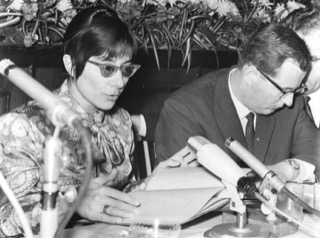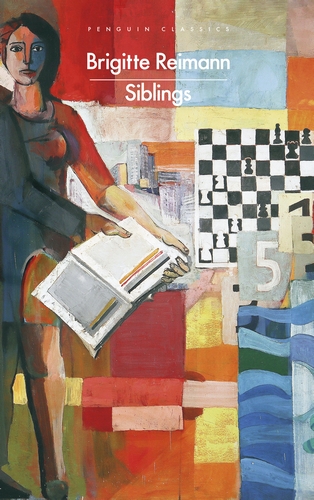Siblings by the GDR writer Brigitte Reimann has just been published in an English translation by Penguin in its series of classic international literature.
In this novella we have an authentic female voice communicating what it felt like to live in the GDR just before the Berlin Wall was sealed in 1961.

The Western allies had introduced the Deutsche Mark in the Western zones in 1948, establishing an exclusive economic area, followed by the establishment of the West German state, the Federal Republic of Germany, in May 1949. In October 1949 the Soviet authorities founded the GDR. Soviet plans right up to 1952 (four Stalin notes) to form a united demilitarised Germany in central Europe as a neutral buffer between the Cold War powers were rejected by the West.
From 1949 to 1961 hopes of reuniting Germany remained in the East. However, as the Cold War accelerated, the Marshall Plan boosted the West German economy, while East Germany alone paid reparations to the USSR. A devastating brain drain took place, the sabotage of East German production sites, and tens of thousands of people working in the West and shopping and living in the subsidised East.
Military espionage contributed to making the open border unsustainable. This led to the gradual closing of the inner-German border to stem the defection of the GDR’s trained work force. Until 13 August 1961 people could leave illegally via West Berlin, after which all borders were sealed.
Western history books spin their own version of events as historical fact. To gain access to historical truth, other than speaking to witnesses of the time, the art of an epoch can give a sense of what it felt like to be alive at a particular time. Siblings does this for the 1950s and early 60s in the GDR.
Brigitte Reimann knew the times she wrote about intimately. Siblings had been preceded by other texts, which had alerted the GDR reading public to her. These trace recent German history from the Nazi dictatorship, the full acceptance of the guilt of the past, to members of an East German family deciding in which of the two German states they would live (Siblings, 1963). In each of these novellas a young woman needs to make hard decisions. All of them are working women, protagonists that became Reimann’s signal subject.
Ankunft im Alltag (1961)—Arrival in Everyday Normality—signalled the arrival of the society and its people in a new normality, the building of socialism and the world of work.
In 1959 a significant cultural political conference took place in Bitterfeld. The recent congress of the ruling party, the Socialist Unity Party (SED), had directed that the working class should be enabled to conquer the heights of art, that any divisions between social strata should be overcome, and that there should be no gulf between art and life.
The Writers’ Union in the petrochemical plant of Bitterfeld then determined that GDR artists should spend time in production, and run creative workshops in factories for aspiring working-class writers, from which some well-known authors later emanated. Also, the artists themselves were encouraged to write about the lives of ordinary working-class people.
Brigitte Reimann supported this movement with heart and hand.
In Siblings, Elisabeth is a painter who is deeply involved with life in a lignite plant, as are other characters around her. The novella revolves around this industrial core; it is what forges the lives of the characters. There she runs a workshop for worker-painters, some of whom show real talent. And it is in this setting that a variety of conflicts arise.
Reimann’s contemporary Christa Wolf addressed the same subject, of a young working woman having to decide between her fulfilling working life in the GDR and following her lover to the West, in her novella Der Geteilte Himmel (1963)—“Divided Heaven,” “They Divided the Sky”).
Both novellas evoke the early sixties in the GDR, shortly before the Berlin Wall was erected. Both authors identify with the GDR, as do their protagonists. Reimann made the world of work the core sphere of her texts, in which her characters and their conflicts are fully integrated. The most famous of these is the unfinished novel Franziska Linkerhand (1974), with a subtitled GDR drama based on the book, Our Short Life (1981), in which Reimann explores the difficulties encountered by a young architect who strives to build towns where people will live in fulfilment.
Epic stories arising from women at work, their growing social equality stemming from economic independence, became a hallmark of GDR literature. Yet GDR art was the sphere where the most open criticism was voiced and therefore the arts became critically important for GDR citizens. Siblings too contains criticism of party apparatchiks with tunnel vision.
However, the family, which loses one son to the West and another one almost, has a father who confronts his sons with the money their education cost society and what their defection means financially to the state. Daughter Elisabeth fully identifies with the aspirations of the socialist state and fights for her rights and her dignity within this new society.
The novella, like most GDR literature, expresses women’s confidence in their legislated social equality. Closely linked to this is Reimann’s search for and tracing of a new humanity emerging with the development of socialism: how people change when living in a society that puts their interests before profits. She examines the extent to which they identify with this state and how this affects their daily lives, their relationships with one another.
Central to these questions is the role of work. Her depiction of the brain and skill drain has lost none of its relevance in today’s world, both within the EU and globally.
GDR literature and art have been widely suppressed as part of the blanket rewriting of its history by the West. Read it to remember what had once been possible in Germany.






